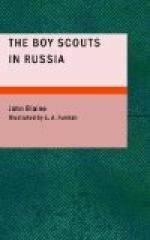To make sure, Fred studied both men. And not once did either of them look back or up. Their attention did not seem to centre on the house at all. It was as if their instructions were more to prevent a surprise attack from outside, or the coming of some spy, than to watch those who were already in the house.
Once he had made up his mind, Fred buried himself deeper in the shrubbery and risked using his pocket flashlight while he wrote a note to Boris, telling him what he had learned of the movements of the sentries. He told Boris, also, not to draw up the rope at once, but to climb from his window to the flat roof, something easy enough to manage, and then to move along five paces. There the rope, when it was drawn up, would be invisible against the grey stone of the house wall, whereas, against a lighted window, it would show up so plainly that the most stupid sentry would be sure to see it.
Fred had substituted a tennis ball for the stone he had originally intended to throw. The ball had many advantages. In case his aim was bad, the ball would not make a noise if it fell or if it struck against the wall, while the sound of a stone would have betrayed them had he failed to put it through the window. Now he tied his note to the ball, making it firm and secure with the end of a ball of twine. About his body he had coiled a long, very thin, very strong rope. After Boris had the end of the cord he would fasten the rope to his end, and so enable Boris to draw it up. And to guard against losing the end of the cord, he tied it to his own left wrist.
He waited for the sentries to meet; gave the one who stayed on his side a start, and then, taking careful aim, threw his ball. At home Fred had played baseball. More than once a game had depended on the accuracy of his toss of a hot grounder to the first baseman. In basketball games, he had stood, with the score tied, to shoot for the basket on a foul, when the outcome was to be settled by the accuracy of his throw. But never had he been as nervous as he was now. The ball flew straight and true, however. He saw it enter the window. And the next moment a tug on his wrist told him that Boris had it.
He waited breathlessly. Then two short pulls signalled that Boris had read his note and would follow his instructions. He gave three sharp tugs, and then settled down to wait, with beating heart, for now the crucial test was coming. The other sentry was about to appear. If he noticed the thin string, by any chance, the whole scheme would be spoiled and Fred, in all probability, would be caught and treated as a spy.
The man came around the corner of the house, walking slowly, his head down. As he neared the twine he stopped for just a moment and looked up. Fred scarcely dared to breathe. He knew what had happened. The twine had brushed against the sentry’s cheek. But then a puff of wind carried it away, and the man went on, brushing at his cheek, thinking, perhaps, a moth had touched it.




